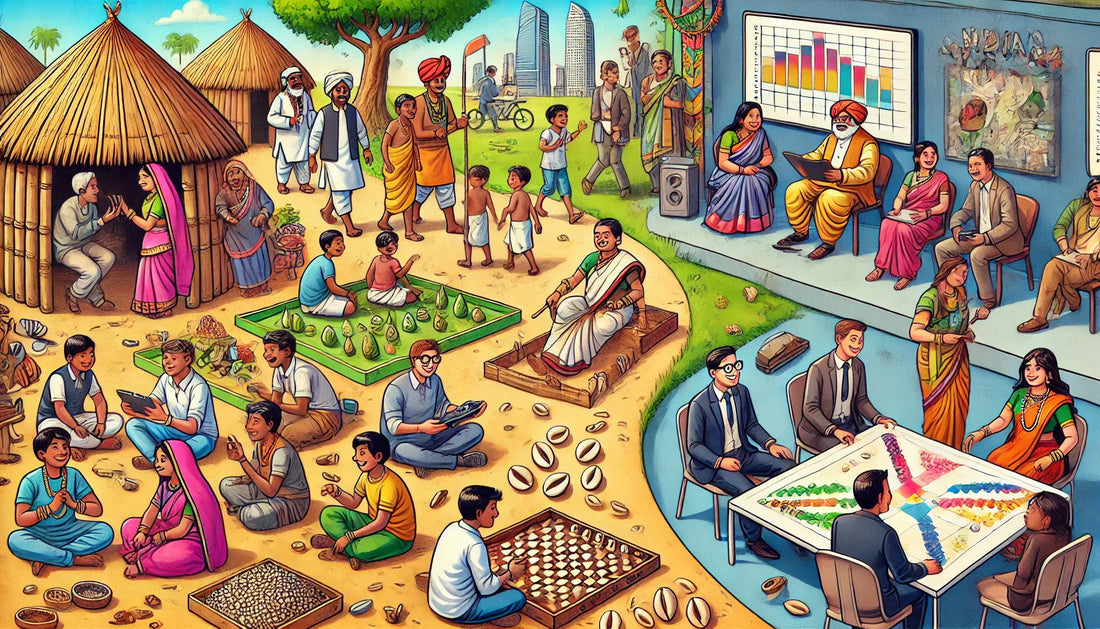
The Global Journey of Indian Board Games: From Local Traditions to International Recognition
Share
Check Out All The Handcrafted Indian Traditional Board Games Here
Indian board games have carved a niche in the global gaming landscape, tracing a fascinating journey from the dusty rural courtyards of India to sleek international gaming conventions. This transformation from local pastimes to globally recognized games offers a compelling narrative of cultural exchange, adaptation, and revival.
Historical Roots and Cultural Significance
The history of Indian board games dates back thousands of years, with mentions in ancient texts and archaeological evidence supporting their longstanding presence in daily life. Games like Chaturanga, the precursor to modern chess, and Pachisi, the ancestor of Ludo, have origins steeped in the epic tales of Mahabharata and Ramayana, reflecting the deep philosophical and strategic thinking of ancient India. These games were not only forms of entertainment but also tools for teaching strategy, ethics, and social conduct.
The Philosophical Underpinnings
Each game in the traditional Indian repertoire carries a deeper philosophical or educational purpose. For example, the game of Navakankari, also known as Nine Men's Morris, is believed to symbolize the concept of karma and destiny, as every move can significantly alter the fate of the game, much like choices in lifead Appeal Across Age Groups
One of the most remarkable aspects of Indian board games is their universal appeal across different age groups. These games are ingeniously designed to cater to various levels of skill and understanding. For instance, Chowka Bara, a race game using cowrie shells for dice, is popular among both children learning counting and strategy, and adults who enjoy the thrill of chance and tactics.
Educational Benefits
Modern research has highlighted the cognitive and educational benefits of these traditional games. They enhance critical thinking, strategic planning, and social interaction skills. Games like Aadu Huli (Tiger and Goat) and Pagade (Indian Pachisi) are not only fun but also enrich players' problem-solving abilities and understanding of mathematical concepts. Read more about the educational impact of traditional games on cognitive development.
International Acclaim and Adaptations
As the world becomes more interconnected, Indian board games have gained international recognition, with adaptations and themed versions appearing across global markets. For instance, Chaturanga evolved into various forms of chess around the world, and Pachisi was adapted into the widely popular game of Ludo.
Global Tournaments and Cultural Exchanges
Indian board games have also made their way into international board game tournaments and cultural festivals, serving as a bridge between diverse cultures. These events often feature games like Sholo Gutti (12 pits) and Alaguli Mane (mancala games), showcasing the rich gaming heritage of India. Explore upcoming cultural events featuring traditional games.
Revival and Modern Interpretations
In recent years, there has been a significant revival of interest in traditional Indian board games, thanks to various cultural entrepreneurs and game designers who have introduced these games to a new generation. Companies like Roll the Dice are at the forefront of this revival, producing beautifully crafted, eco-friendly game sets that adhere to traditional designs while appealing to contemporary aesthetics.
Online Platforms and Digital Adaptations
Digital platforms like Tollugatti, which offer digital versions of these traditional games, have played a crucial role in making them accessible to a global audience. These platforms allow players from different parts of the world to connect and play together, transcending geographical boundaries.
The journey of Indian board games from local tradition to international acclaim is a testament to their timeless appeal and cultural significance. As they continue to cross borders and generations, they remind us of the universal language of play and the rich tapestry of Indian heritage. Explore more about these traditional games and their modern adaptations at Roll the Dice, where culture meets contemporary gaming.
By delving into the historical and cultural narratives of Indian board games, this blog post aims to highlight their broad appeal and the significant role they play in connecting people across the world. Whether you are a history buff, a gaming enthusiast, or someone looking for a meaningful way to spend time with loved ones, these games offer something for everyone.
